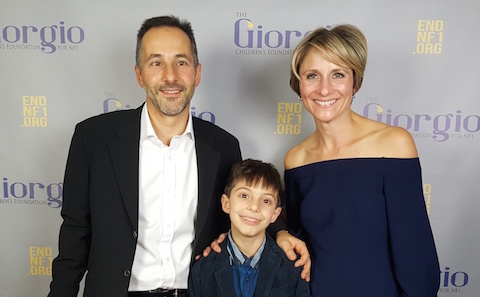Family foundation battles common childhood neurological disorder
 |
|
Nick and Erin Borzellino with their son, Giorgio.
|
By Erin Prather Stafford
When their son Giorgio was born, heightened parental instincts immediately kicked in for Erin and Nick Borzellino. They sensed their son’s development was not normal as he began missing significant childhood milestones. Doctors first suspected autism, but then a neurologist correctly diagnosed neurofibromatosis type 1 (NF1) when Giorgio was 5 years old.
To fight the disease, the Borzellino family established The Giorgio Foundation, which directly funds researchers focused on NF1. One grant recipient at UT Southwestern Medical Center is Dr. Lu Le, Associate Professor of Dermatology, who received $93,500 in support. Dr. Le is part of an NF1 Consortium, established by The Giorgio Foundation, to empower leading researchers in the field to work together to discover effective treatments for this surprisingly prevalent but little-known condition.
“We are committed to understanding the causes of NF1 and translating those findings into improved treatments for children like Giorgio and others who are living with this harrowing disease,” said Dr. Daniel K. Podolsky, President of UT Southwestern. “This work is made possible by families like the Borzellinos who are committed to a better future for all families who are impacted by NF1.”
One of the most common neurological disorders, NF1 is typically diagnosed in early childhood. It disables the gene that normally blocks tumor growth, which results in hundreds or even thousands of painful and disfiguring tumors on the skin, in nerve tissues, and throughout the body. According to the National Institutes of Health, NF1 occurs in roughly 1 in 3,000 people in the U.S. More than 80 percent of NF1 patients experience life-altering complications, the most prevalent being disfiguring skin tumors. Most people with NF1 have recognizable signs before the age of 10.
“Patients suffering from NF1 would come to our clinic, begging to get rid of these tumors, and I had no effective medical treatments to offer them,” said Dr. Le, Co-Director of UT Southwestern’s Comprehensive Neurofibromatosis Clinic and a member of the National Cancer Institute-designated Harold C. Simmons Comprehensive Cancer Center. “In the lab, we recently gained insight into the specific type of cell that gives rise to these tumors and can now begin to understand the steps that lead to their development. These findings could lead to designed drug inhibitors that prevent or slow tumor formation.”
NF1 patients have a lifetime risk of the deeper tumors in nerve tissues developing into malignant peripheral nerve sheath tumors, a deadly, incurable type of soft-tissue cancer. Due to their unusual growth capacity, the tumors can be life threatening, damaging vital organs or neural function.
Ms. Borzellino understands Giorgio’s future health challenges cannot be predicted. Now 10, he has been diagnosed with dyslexia, ADHD, scoliosis, and two tumors near his spine and windpipe. Because Giorgio continues to exceed all expectations, she remains optimistic.
“He is loved by friends, teachers, bus drivers … everyone he meets because of his cheerful personality and empathy for others,” she said. “We are constantly inspired by his positive attitude and outlook; Giorgio simply refuses to be defined by NF1. Our biggest hope is someday a cure will be found benefiting Giorgio and the many children like him.”
Added Dr. Le, “The commitment from The Giorgio Foundation to discover treatment is incredible. Although this disorder can destroy quality of life, mortality is relatively low. That makes funding difficult to obtain so the foundation’s efforts are making a significant difference regarding our research and its future. I’m incredibly honored and grateful that The Giorgio Foundation chose us.”
More information about The Giorgio Foundation’s NF1 Consortium is available at the Giorgio Foundation website.
Dr. Lu Le holds the Thomas L. Shields, M.D. Professorship in Dermatology.
Dr. Podolsky holds the Philip O’Bryan Montgomery, Jr., M.D. Distinguished Presidential Chair in Academic Administration, and the Doris and Bryan Wildenthal Distinguished Chair in Medical Science.